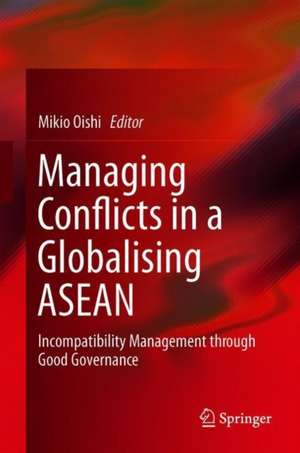Managing Conflicts in a Globalizing ASEAN: Incompatibility Management through Good Governance
Editat de Mikio Oishien Limba Engleză Hardback – 25 noi 2019
| Toate formatele și edițiile | Preț | Express |
|---|---|---|
| Paperback (1) | 886.92 lei 6-8 săpt. | |
| Springer Nature Singapore – 25 noi 2020 | 886.92 lei 6-8 săpt. | |
| Hardback (1) | 892.90 lei 6-8 săpt. | |
| Springer Nature Singapore – 25 noi 2019 | 892.90 lei 6-8 săpt. |
Preț: 892.90 lei
Preț vechi: 1088.90 lei
-18% Nou
Puncte Express: 1339
Preț estimativ în valută:
170.85€ • 178.40$ • 141.09£
170.85€ • 178.40$ • 141.09£
Carte tipărită la comandă
Livrare economică 15-29 aprilie
Preluare comenzi: 021 569.72.76
Specificații
ISBN-13: 9789813295698
ISBN-10: 9813295694
Pagini: 220
Ilustrații: VI, 220 p. 1 illus.
Dimensiuni: 155 x 235 x 20 mm
Greutate: 0.5 kg
Ediția:1st ed. 2020
Editura: Springer Nature Singapore
Colecția Springer
Locul publicării:Singapore, Singapore
ISBN-10: 9813295694
Pagini: 220
Ilustrații: VI, 220 p. 1 illus.
Dimensiuni: 155 x 235 x 20 mm
Greutate: 0.5 kg
Ediția:1st ed. 2020
Editura: Springer Nature Singapore
Colecția Springer
Locul publicării:Singapore, Singapore
Cuprins
1 Introduction.- 2 The plight of Rohingya people in Myanmar and ASEAN’s role in its settlement.- 3 Addressing separatism by ethnic nationalities in Myanmar.- 4 Coping with a transnational conflict involving the Khmer Krom people in Vietnam.- 5 In search of a just settlement to the conflict in West Papua, Indonesia.- 6 A political conflict in the democratisation of Thailand and its management.- 7 Managing the Mekong River disputes.- 8 Preventing dispute over haze through regional and local governance.- 9 Defence diplomacy for the management of the South China Sea dispute.- 10 Conclusion.
Notă biografică
Mikio Oishi is an Associate Professor in the Faculty of Humanities, Arts and Heritage at Universiti Malaysia Sabah. Since gaining his PhD in Peace and Conflict Studies at the University of Bradford in 1995, he has been involved in research and publication on Peace and Conflict studies, focusing on the Asia-Pacific region. Knowledgeable in the world’s major spiritual and humanistic traditions, he is interested in developing a holistic approach to conflict management and transformation in Asian countries, as well as seeking a regional security order reflecting the rich cultures, values and norms of the Asia-Pacific.
Textul de pe ultima copertă
This book investigates the patterns of conflict management in contemporary Southeast Asia. The region has long been characterized by the twin process of state-formation and nation-building, which has been responsible for most of the region’s intrastate and interstate conflicts. While this process is still ongoing, regional conflicts and their management are increasingly affected by globalisation, which not only serves as a new source of, or exacerbating factor to, conflict, but also makes new instruments available for conflict management. Employing the concepts of incompatibility management and mediation regime, the book analyses the management of seven conflicts in the region: the Rohingya crisis and the Kachin conflict in Myanmar, the Khmer Krom conflict in Vietnam, the West Papua conflict in Indonesia, the political conflict in Thailand, the Mekong River conflicts involving five Southeast Asian countries and China and the transboundary haze problem emanating from Indonesia. The efforts to manage each of them are imagined as constituting a mediation regime, and its effectiveness is assessed in terms of good governance. Among the findings of the book is that the measures of manoeuvring around incompatibilities are employed predominantly in managing regional conflicts. In intrastate conflicts, which mostly involve ethnic minorities, the authorities first aim to eliminate, or impose its own position on, ethnic parties. When this strategy proves unsuccessful, they have no choice but manoeuvre around incompatibilities, which may eventually open up a space for mutual learning. In interstate conflicts, the manoeuvring around strategy works in a more straightforward manner, contributing to regional stability. However, the stability is achieved at the cost of local communities and the natural environment, which absorb the incompatibilities in conflict.
Caracteristici
Approaches conflicts in Southeast Asia from the perspective of conflict management in the region’s globalisation
Sheds new light on Southeast Asia’s regional stability from the standpoint of managing conflict
Contributes to Peace and Conflict Studies by enhancing the significance of good governance in conflict management and transformation
Highlights local perspectives on the conflicts under study
Sheds new light on Southeast Asia’s regional stability from the standpoint of managing conflict
Contributes to Peace and Conflict Studies by enhancing the significance of good governance in conflict management and transformation
Highlights local perspectives on the conflicts under study
